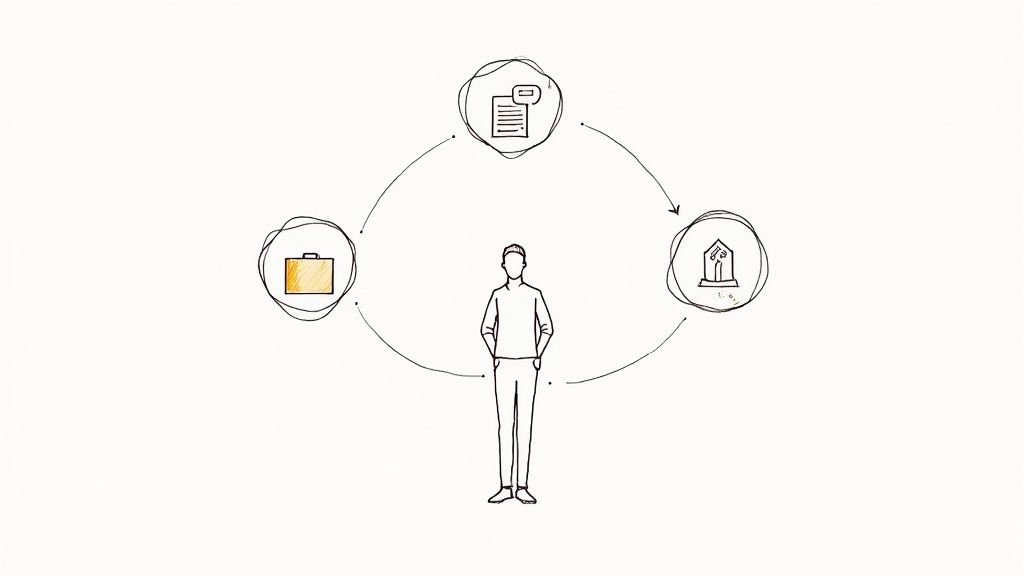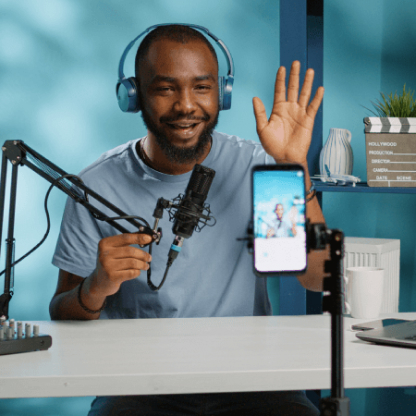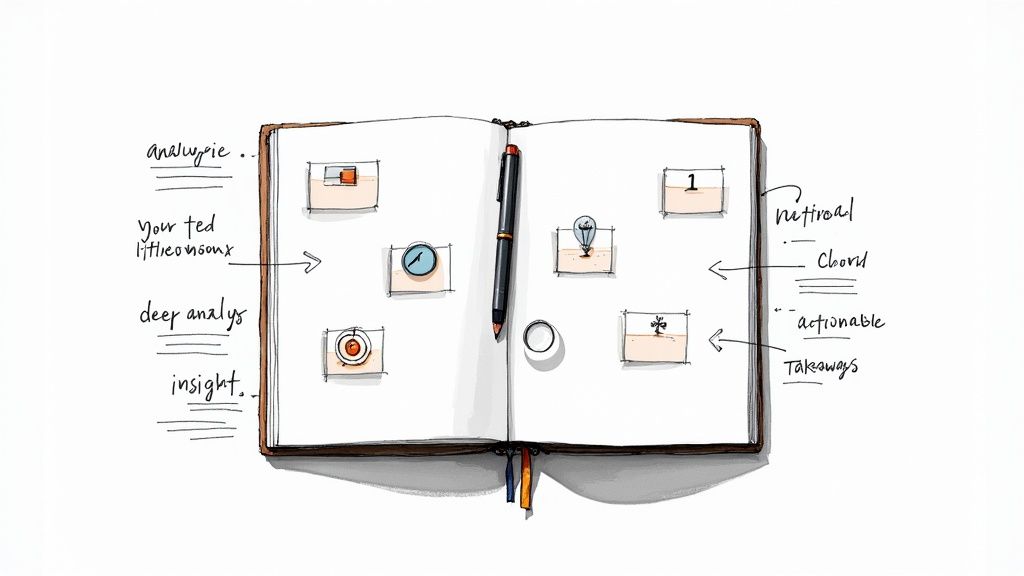Let’s be honest. Most interview questions are garbage. They’re predictable, easy to game, and tell you almost nothing about how someone will actually perform. You ask, “What’s your greatest weakness?” and they say, “Oh, I’m just too much of a perfectionist.” Groundbreaking. You're left with a rehearsed answer and no real insight.
Hope you enjoy spending your afternoons fact-checking resumes and running endless interview loops, because that’s the result of asking the wrong things. Turns out there’s more than one way to hire elite talent without mortgaging your office ping-pong table. I've been in the trenches, hired my fair share of rockstars (and a few duds, let's not lie), and I've learned that the quality of your questions determines the quality of your hire.
This isn't just another generic list. This is a founder's playbook of the essential questions to ask an applicant during an interview that cut through the fluff and get to what actually matters. We're going to break down not just what to ask, but why each question works, what red flags to look for, and how to interpret the answers. Ready to stop guessing and start hiring with confidence? Let's get to it.
1. Tell me about yourself
Look, I know what you’re thinking. "Tell me about yourself" feels like the vanilla ice cream of interview questions. It’s the one everyone expects, the one that can lead to five minutes of rambling about their childhood dog. But don’t write it off. When used correctly, this opener is less of a question and more of a diagnostic tool. You’re handing the candidate a blank canvas to see what they choose to paint.

What you're really asking is, "Can you synthesize your entire professional life into a compelling, relevant narrative in under three minutes?" Their answer reveals their communication skills, self-awareness, and understanding of the role far better than a direct question ever could.
Why It’s a Must-Ask Question
This isn't just a warm-up; it’s a strategic first move. A great answer connects the dots between their past experiences and your company's future. A mediocre one meanders. A terrible one sounds like they’re reading their resume aloud for the first time.
- McKinsey & Company uses this to assess structured thinking. Can the candidate present a logical, top-down narrative of their career?
- Startups use it to find passion. Does their story light up when they talk about a specific project, or is it just a list of jobs?
- Google famously uses it to get an early read on communication style and cultural alignment.
How to Implement It Effectively
Don’t just throw it out there and zone out. Your job is to guide and listen actively.
Pro Tip: Frame the question to get the best results. Instead of just "Tell me about yourself," try, "Walk me through your resume, but focus on the parts you feel are most relevant to this position."
- Set a Time Limit: Gently suggest a two-to-three-minute timeframe. This encourages focus and respects everyone's time.
- Listen for Relevance: Are they connecting their experience to the job description, or are they just listing accomplishments? The best candidates tailor their story to you.
- Note Their Emphasis: What do they highlight first? Is it a technical skill, a major achievement, or their leadership experience? This tells you what they value most about themselves professionally.
- Prepare Follow-Ups: Their answer is a goldmine for your next questions. If they mention a challenging project, dig into it. "You mentioned reorganizing the sales team at X Corp; what was the biggest obstacle you faced there?"
2. What are your greatest strengths?
I see you rolling your eyes. This question is so common it’s become a cliché, often inviting answers like "I'm a perfectionist" or "I work too hard." But beneath its deceptively simple surface lies a powerful tool for gauging a candidate's self-awareness and alignment. You're not just asking for a list of skills; you're asking them to articulate their unique value proposition.

What you’re really asking is, "Do you understand what makes you effective, and can you prove it with evidence?" Their answer separates the candidates who have genuinely reflected on their capabilities from those who just memorized a generic response. It’s a direct line into how they see their contribution to your team.
Why It’s a Must-Ask Question
This question moves beyond the resume to uncover how a candidate perceives their own impact. A strong answer is specific, relevant to the job, and backed by a concise example. A weak answer is vague, arrogant, or completely disconnected from your needs.
- Amazon uses this to see if a candidate’s strengths map to their famous Leadership Principles, such as "Ownership" or "Customer Obsession."
- Sales organizations listen for strengths in relationship-building, resilience, and persuasion.
- Tech companies use it to evaluate if a candidate’s primary strengths are in problem-solving, specific coding languages, or systems architecture.
How to Implement It Effectively
Your goal is to push past the rehearsed answers and get to the core of their abilities. Don’t let them get away with a simple adjective.
Pro Tip: Follow up immediately with, "Can you give me a specific example of when you used that strength to achieve a measurable outcome?" This forces them to provide concrete proof.
- Listen for Authenticity: Does their answer sound like it came from a "Top 10 Interview Answers" article, or does it reflect genuine self-assessment? Many people struggle with this, so you might suggest they explore strategies for identifying personal and professional strengths to better prepare.
- Align with Job Needs: The "greatest strength" is only great if it’s one you actually need. If they highlight their creative writing skills for a data analyst role, that’s a miss.
- Probe for Context: If they claim "communication" is a strength, ask them to describe a situation where their communication skills prevented a project from failing.
- Note Their Humility and Confidence: The best answers strike a balance. They are confident in their abilities without sounding arrogant. This question is a great test of a candidate’s emotional intelligence.
3. Describe a challenging situation and how you handled it
Ah, the classic "tell me about a time you failed" question, but dressed in a business suit. This isn't about setting a trap or enjoying a story of workplace drama. It’s a surgical tool designed to peel back the layers of a polished resume and see the real problem-solver underneath. You're not just hiring for sunny days; you're hiring for the inevitable storms.

What you’re really asking is, "When things go sideways, do you panic, point fingers, or take ownership and find a path forward?" Their answer is a direct window into their resilience, accountability, and practical decision-making skills when under pressure. It’s one of the best predictors of future performance you can get.
Why It’s a Must-Ask Question
Past behavior is the best predictor of future action. This question moves beyond hypotheticals and into concrete evidence of a candidate’s competence. A great answer is a mini-case study in professionalism, while a weak one reveals a lack of self-awareness or an inability to handle adversity.
- Microsoft uses this to assess an applicant's growth mindset. Do they blame others, or do they discuss what they learned from the experience?
- Healthcare Organizations rely on it to evaluate crisis management. How does a candidate react when patient safety or critical systems are on the line?
- Financial Services Firms probe for risk management and integrity. Did they follow protocol, escalate appropriately, and protect assets under pressure?
How to Implement It Effectively
Your goal isn't just to hear a story; it's to dissect it. You need to actively guide the candidate toward a structured, insightful answer.
Pro Tip: Don't let them off the hook with a vague response. If their challenge sounds too simple, press for a more significant example. A genuine challenge involves real stakes.
- Listen for the STAR Method: The best candidates will naturally use the STAR method (Situation, Task, Action, Result). If they don’t, guide them. "What was the specific situation? What task were you responsible for? What action did you take? And what was the final result?"
- Look for Ownership: Do they own their role in the problem, or is it a story about a terrible boss and lazy colleagues? Look for "I" statements, not "they" statements.
- Assess the Learning: The most critical part of the answer is the "result" and reflection. Ask, "What would you do differently next time?" A candidate who can't answer this hasn't truly learned from the experience. For more on this, check out our guide on tackling workplace issues with grace.
- Verify the Challenge: Was the situation genuinely difficult, or was it a routine issue they're inflating? The scale of the problem they choose to share reveals their definition of "challenging."
4. Why do you want to work for our company?
Let's be real, you've heard the canned answers a thousand times. "I'm passionate about your industry," or "I'm looking for a new challenge." This question isn't about collecting compliments; it's a litmus test for genuine interest versus a copy-paste job application. You're trying to separate the candidates who want a job from the ones who want this job.

What you’re really asking is, "Have you done more than 30 seconds of research on us, and can you connect your personal aspirations to our company's mission?" Their answer reveals their motivation, level of preparation, and whether they see this role as a long-term fit or just another stepping stone.
Why It’s a Must-Ask Question
This question cuts through the fluff and gets to the heart of a candidate's intent. A great answer shows they've looked beyond the job description and understand your company's place in the market, its culture, and its mission. A bad answer sounds like they could be talking about any of your competitors.
- Apple looks for people who bleed its brand values. An answer about their passion for user-centric design and innovation will resonate far more than one about salary.
- Nonprofits use this to gauge authentic commitment. Do they talk about the organization's impact and mission, or just the role's responsibilities?
- Startups want to see excitement for the vision. The best candidates can articulate why they're thrilled by the company’s specific growth potential and disruptive ideas.
How to Implement It Effectively
Don't let them get away with a generic response. Your goal is to probe for specifics and gauge the authenticity of their enthusiasm.
Pro Tip: Frame the question to elicit a deeper response. Instead of the standard version, try, "Beyond the job description, what specifically about our company’s mission or recent projects excites you?"
- Listen for Researched Details: Did they mention a recent product launch, a blog post from your CEO, or a specific company value from your website? This shows they’ve done their homework.
- Assess Value Alignment: Their reasons should connect to your company culture. If you’re a collaborative, flat organization, an answer focused on climbing a rigid corporate ladder is a red flag.
- Watch for Authenticity: Flattery is easy to spot. A genuine answer connects their personal or professional values to something specific the company does.
- Follow Up on Vague Statements: If they say, "I'm impressed by your company culture," ask for an example. "That's great to hear. What have you read or heard that gave you that impression?"
5. Where do you see yourself in five years?
Ah, the five-year question. The crystal ball of interviews, often met with either an overly ambitious fantasy or a canned, generic response. But don’t dismiss it as hiring fluff. This question isn't about predicting the future; it's about revealing a candidate's ambition, self-awareness, and most importantly, their potential alignment with your company's trajectory.
What you’re really asking is, "Are your long-term goals something we can help you achieve, or are you just using this job as a temporary lily pad?" Their answer tells you whether they see this role as a destination or just a quick stop on their journey. It's a critical piece of the puzzle when you're looking for questions to ask an applicant during an interview that gauge long-term fit.
Why It’s a Must-Ask Question
This is your retention forecast. A candidate whose goals are completely detached from what your company can offer is a flight risk waiting to happen. A thoughtful answer, however, shows they've considered their career path and how this specific role fits into it.
- Consulting firms use this to identify future partners. Are they aiming for that leadership track, or are they planning to jump to industry after a few years?
- Tech companies use it to distinguish between candidates who want to become senior individual contributors and those aspiring to management.
- Healthcare organizations evaluate specialization goals to see if they align with the hospital’s own growth plans and patient needs.
How to Implement It Effectively
The key is to listen for the "how" and "why" behind their five-year plan, not just the "what."
Pro Tip: Frame the question to invite a more grounded response. Try, "If you were to join us, what would a successful five-year journey within our company look like for you?"
- Listen for Alignment: Do their aspirations match the growth paths available at your company? If they want to manage a team of 20 and you're a flat-structured startup, that’s a red flag.
- Assess Realism: Is their plan grounded in reality, or are they expecting a C-suite title in two years with no clear path? A realistic plan shows maturity and strategic thinking.
- Note Their Planning Skills: The best candidates won't just state a goal; they’ll mention the skills they want to develop or the milestones they hope to achieve along the way.
- Prepare Follow-Ups: Use their answer to see if they've done their homework. "That's an interesting goal. What opportunities here at [Your Company] do you think would help you get there?"
6. What are your salary expectations?
Let's talk about the elephant in the room: money. Asking "What are your salary expectations?" can feel like the most awkward part of the interview dance. But avoiding it is like playing poker without looking at your cards—you’re just hoping for the best, and hope is not a hiring strategy. This isn't just a logistical question; it’s a peek into a candidate’s self-worth, market awareness, and professionalism.
What you're really asking is, "Are we even in the same ballpark, and do you know what you're worth?" Their answer tells you whether you can afford them, but it also reveals if they've done their homework. A well-researched answer shows diligence, while a wildly out-of-touch number can be a red flag for their overall judgment.
Why It’s a Must-Ask Question
This is about efficiency and respect. You save everyone’s time by ensuring financial expectations align before you get to the final offer stage. A candidate who feels low-balled at the end of a long process is a candidate you’ll lose.
- Startups use this to open a dialogue about equity versus cash. A candidate's reaction can show if they’re truly bought into the long-term vision or just looking for a quick payday.
- Large Corporations need it to ensure candidates fit within predefined salary bands. It’s a simple filter to prevent moving forward with someone whose expectations the company can’t meet.
- Contract Positions rely on this to set clear terms from day one, whether it's an hourly rate or a fixed project fee.
How to Implement It Effectively
Timing and framing are everything. Ask too early, and you risk making the conversation transactional. Wait too long, and you risk wasting hours on a candidate who is out of budget.
Pro Tip: Frame it as a mutual alignment check. Try, "To make sure we're on the same page and respect your time, could you share the salary range you're targeting for your next role?"
- Do Your Homework First: Know the market rate for the role inside and out. This gives you a solid benchmark to evaluate their answer against.
- Discuss Total Compensation: If they give a number, be prepared to talk about bonuses, equity, benefits, and perks. Sometimes a lower base salary is acceptable if the total package is strong.
- Be Transparent (If You Can): If you have a set budget, consider sharing the range upfront. This builds trust and sets realistic expectations from the get-go.
- Note Their Justification: Listen for how they answer. Do they back up their number with market data, their specific skills, or past earnings? This shows their level of preparation and negotiation savvy.
7. Do you have any questions for us?
This isn’t just a polite way to wrap things up. Think of it as the interview equivalent of a post-credits scene; it often reveals more than the main feature. When you flip the script and ask, "Do you have any questions for us?" you’re not just checking a box. You’re handing the candidate a microphone to see what they really care about.
What you're really asking is, "Show me how deeply you've thought about this opportunity beyond the job description." Their questions are a direct window into their priorities, preparation level, and whether they see this as a two-way street or just another paycheck. An engaged candidate interviews you right back.
Why It’s a Must-Ask Question
This is your final data point and a crucial one. It separates the candidates who want a job from those who want this job. A candidate with no questions is a major red flag, suggesting a lack of curiosity or preparation.
- Consulting firms use this to spot strategic thinkers. Do they ask about market challenges, or do they ask about the lunch menu?
- Tech companies want to see forward-thinking. Questions about the product roadmap or engineering culture show genuine investment.
- Sales-driven organizations look for questions about performance metrics and team targets, which signals a results-oriented mindset.
How to Implement It Effectively
Don't rush this part. The quality of your answers is as important as the quality of their questions. This is your chance to sell the role to a great candidate.
Pro Tip: Frame it as an open invitation. Say, "We've asked you a lot of questions, but this is also about you finding the right fit. What’s on your mind? What can we clarify about the role, team, or company?"
- Listen to the 'Why': Pay attention to the themes. Are their questions focused on compensation and benefits, or are they about impact, growth, and team dynamics? This reveals their core motivators.
- Gauge Their Research: A great question is one they couldn't just Google. "I saw your CEO mentioned X initiative in a recent podcast; how does this role contribute to that?" shows they did their homework.
- Be Prepared for Tough Questions: Top candidates will ask about challenges, recent departures, or company weaknesses. Your transparent and thoughtful response can be a deciding factor. Answering these well is crucial, especially when adapting to new formats; you can find more guidance on handling these moments in virtual interview tips.
- Note the Number of Questions: One or two generic questions feel obligatory. A handful of thoughtful, specific questions shows genuine interest and engagement.
8. Why are you leaving your current job?
This question is less of a question and more of a polygraph test for professionalism. On the surface, it’s simple. Dig a little deeper, and you’re asking, “Are you running away from a fire you started, or are you running toward a better opportunity?” The answer is a direct window into their motivation, self-awareness, and how they handle conflict.
What you’re really asking is, "Can you frame your departure professionally without throwing your last boss under the bus?" Their narrative reveals whether they seek growth or simply escape problems. A candidate who takes ownership and focuses on the future is leagues ahead of one who just wants to complain.
Why It’s a Must-Ask Question
This isn’t about digging for dirt; it’s about understanding drive. A great answer is forward-looking and positive. A bad one is a highlight reel of past grievances, which is a major red flag that they might bring that same energy to your team.
- Financial firms use this to screen for discretion. Can the candidate discuss a sensitive topic like leaving a job without revealing confidential details or speaking ill of former colleagues?
- Tech companies use it to find ambition. Are they leaving because they’ve hit a ceiling and want new technical challenges, or because they couldn’t keep up?
- Non-profits often use it to check for mission alignment. Are they leaving a corporate job for a role with more purpose, or just for a change of scenery?
How to Implement It Effectively
Your goal is to listen for the “why” behind the “what.” Don’t let them get away with a generic answer.
Pro Tip: Frame the question to focus on the future. Try, "What are you hoping to find in your next role that you aren't getting in your current one?" This encourages a positive, growth-oriented response.
- Listen for Professionalism: The number one rule is not bad-mouthing a former employer. A candidate who complains about their old company will likely complain about yours one day.
- Look for Ownership: If they mention a conflict or a problem, do they take any responsibility? "The role evolved in a direction that didn't align with my strengths" is much better than "My boss had no idea what he was doing."
- Identify Push vs. Pull Factors: Are they being "pushed" out by negative circumstances (bad manager, toxic culture) or "pulled" toward something positive (growth, new skills, your company's mission)? You want candidates who are pulled. Learn more about how to interpret the reasons a candidate gives for why they are leaving their current job.
- Check for Patterns: If their resume shows a history of short stints, their answer here is crucial. Is there a pattern of running from similar "problems" at every job?
Key Interview Questions Comparison
| Question | Implementation Complexity 🔄 | Resource Requirements ⚡ | Expected Outcomes 📊 | Ideal Use Cases 💡 | Key Advantages ⭐ |
|---|---|---|---|---|---|
| Tell me about yourself | Low – open-ended, flexible | Minimal – relies on conversation | Overview of background, communication skills | Icebreaker, initial impressions, assess storytelling | Reveals candidate priorities and self-perception |
| What are your greatest strengths? | Medium – requires candidate examples | Moderate – needs probing | Insight into self-awareness and alignment | Evaluating confidence, value proposition, job-relevance | Directly addresses job-relevant capabilities |
| Describe a challenging situation | High – structured behavioral method | Higher – requires STAR evaluation | Evidence of problem-solving and resilience | Assessing past performance, decision-making under pressure | Predicts future behavior from past actions |
| Why do you want to work for our company? | Low – straightforward question | Minimal – company research required | Assessment of cultural fit and motivation | Gauging genuine interest, research, and value alignment | Identifies motivated and prepared candidates |
| Where do you see yourself in five years? | Medium – forward-looking | Moderate – requires interpretation | Understanding ambition and retention potential | Career planning, growth potential assessment | Reveals long-term fit and development needs |
| What are your salary expectations? | Medium – practical and sensitive | Moderate – market data needed | Budget alignment and negotiation baseline | Early salary discussions, budget feasibility | Prevents wasted time, reveals market awareness |
| Do you have any questions for us? | Low – candidate-driven | Minimal – involves active listening | Candidate engagement and priorities | Concluding interview, candidate evaluation of role/company | Reveals curiosity, preparation, and critical thinking |
| Why are you leaving your current job? | Medium – sensitive topic | Moderate – requires discretion | Understanding motivations and red flags | Assessing professionalism, attitude, and job-change reasons | Uncovers motivation and potential performance issues |
From Questions to a Confident Hire: The Real Takeaway
So there you have it. You’re now armed with a list of seemingly simple questions that, when used correctly, can peel back the layers of a polished resume and reveal the actual person underneath. We've moved beyond the tired, predictable script of "What are your greatest strengths?" and transformed it into a powerful diagnostic tool. You know how to reframe classics like "Tell me about yourself" to get a narrative, not just a history lesson, and how to use the dreaded salary question to gauge self-worth and market awareness.
The real takeaway here isn't just the list itself. It's the mindset shift. A great interview isn't an interrogation; it's a diagnostic conversation. You're not just filling a seat, you're making an investment. Each one of these questions to ask an applicant during an interview is a tool designed to gather specific data points on skills, motivation, and cultural alignment. The goal is to move from a gut feeling to a data-backed decision, transforming your hiring process from a gamble into a calculated strategy.
But let's be honest, asking these insightful questions is only half the battle. You can’t get deep, meaningful answers if you’re rushing through back-to-back calls, distracted by scheduling nightmares, and trying to remember who said what. The single biggest lever you can pull to improve your hiring outcomes is creating the space to actually listen. To truly make a confident hire, it’s beneficial to understand the broader context of how a company approaches its hiring process, ensuring every step is deliberate and effective.
This is where you stop being a talent-finding factory and start being a talent magnet. The best candidates aren't just looking for a paycheck; they're evaluating you as much as you're evaluating them. A thoughtful, organized, and respectful interview process signals that you're a thoughtful, organized, and respectful company. When you master not just what to ask, but how you ask it and the environment you create, you stop competing on salary alone. You start winning the candidates who are looking for the right fit, not just the next gig. That’s how you build a team that sticks.
Ready to stop the interview circus and spend your time on candidates who actually matter? Async Interview lets you screen applicants with one-way video interviews, so you can ask your best questions to everyone and only spend live interview time with the high-potential fits. Try Async Interview and start making smarter hires, faster.




